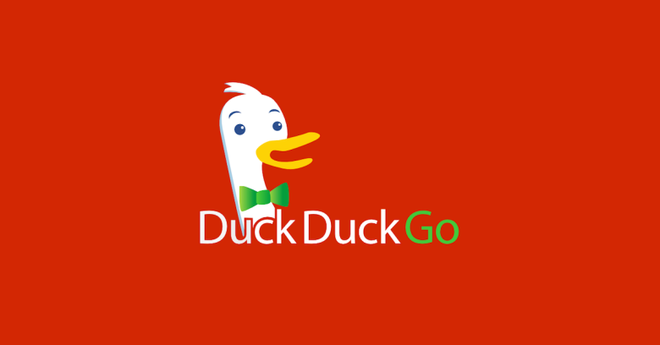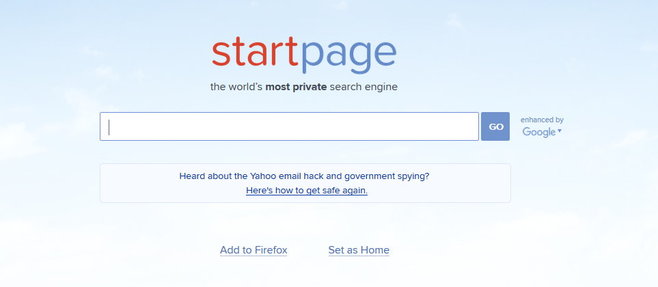Everyone on the Internet uses search engines. There's hundreds of them yet 97 percent of all users focus on just three search providers two of which barely scrape the 3% mark. They are Yahoo Search, owned by communications giant Verizon, and Bing, Microsoft's protegé. With 91% market share, Google effectively has a monopoly and holds incredible influence due to the huge amount of data traffic. Yet, we're all aware that Google makes dubious use of our data. Why not switch to providers that better protect our privacy? Here's a list of 4 search engine alternatives!

One of the oldest is DuckDuckGo. They don't event want to know who they're dealing with. No user data, IP or search history gets saved and there are no personalized ads. Feels good! The almost empty page that only shows a duck and a text field also contributes to this feeling. Only if you look closer, will you see a small menu at the top right that provides access to design and search settings as well as further details including encryption settings. Search results stem from Yahoo Search, Search BOSS, an independent service, and Wikipedia so you won't be missing out on anything. If you want to play it safe: DDG also collaborates with the TOR network which further underscores their commitment to privacy.

Startpage is Google without the data hogging. How it works? The site acts as an intermediary between you and Google, removes anything that may be used to identify you, relays your search request to Google and then shows you the results. Again, there's no IP logging, no Cookies being used and your visit isn't even recorded. It's as if you've never been there! In my tests, search requests took minimally longer due to anonymization but is that really an issue? Unless you're searching for "My elevator is about to crash what can I do?", 1.2 seconds won't matter much. There's no filtering, no personalization and any ads you may encounter will know nothing about you - there's no tracking cookie! And if you're looking for a new email address that comes with better privacy and encryption, they've got you covered, too. Their strong commitment to privacy and the issue of data collection is reflected by the various information on their site. They definitely mean business! It's a great search engine alternative.

MetaGer has been around for a long time and was one of the first search engines I came across, along with Altavista. It's a meta search engine that uses various search engines in parallel for best results. As you might have guessed, "Ger" stands for Germany. Like Startpage, MetaGer processes and anonymizes your request but relays it to a list of multiple search engines and then shows you the results. You may customize that list and results appear swiftly. A special page dedicated to information around science will please researchers and academics alike, great service! The visuals are less appealing as the site looks like work in progress that resembles a cheap online store, shame! The project is open source so if you're a security fanatic and have the skills, you can always take a look under the hood and make sure that things are done properly. MetaGer doesn't store any search details, supports TOR and, aside from the minimalist design, leaves little to be desired. If you're one of those users that like to customize everything, MetaGer is my insider tip for you!

Qwant, on the other hand, is a sight for sore eyes. Like the others, it doesn't track you and won't log your search actions. What's interesting about Qwant is that the service explicitly speaks out against filter bubbles, i.e. the attempt to guess what you might want to search for next based on your previous requests. This may be helpful occasionally (when you're looking for something you've already searched for in the past) but it introduces bias into your search requests. As a specialty, Qwant features an info bar that not only includes common search categories (image, video, news, shopping) but also displays results for music channels and social networks. If you need more features like notes, bookmarks or individual content you'll have to register but even registration only asks for very basic information that won't be passed on to third parties. Good site!
The conclusion is simple: there's life without Google! And there are no withdrawal symptoms. I saw no gaps in the search results with any of the above sites and didn't have to wait noticeable longer. They all use HTTPS for safe encryption. Why stick with Google? It's the age old battle between convenience and data security. If you use Google, they probably already knows you, your search interests, your home address and your hobbies. That's why you may get good search results faster, but is it really worth it? I will try out these alternatives for a month to find out whether I'll be missing something.
Can you even remember how you ended up with Google? And if not: which search engine are you currently using? Do you have any tips?




I tried Duck Duck Go but it kept giving me American rather than Anglo/European websites .... which was a bind at times. This option does come in handy but maybe Duck Duck Go or some other search engine should give us the choice of choosing a countrywide then a continental and also add a global option for our search enquiries?
As an Englishman I am all for globalisation after all the only other option is to become a supplicant ...a "peon!" In view of this I would not mind if Duck Duck Go gave me a truly global option on it's presentation of websites. After all America ...viewed as being a Country rather than as a continent or a landmass ....is so small in comparison with the rest of the world!
Can America cut the mustard anymore... is it big enough. Do the activities of such as google indicate that America is finding it difficult to retain it's dominance without becoming paranoid?. I think they can collect whatever info they choose regardless of any search engine we use.
This point of view begs the question Is The E.U large enough to be a convenient trading block ...should it present itself as America Russia and China does - would it work for us. As far as being dynamic free traders we ...?europeans?..??? always seemed to thrive ..as free traders primarily because we were divided....
Large countries turn in on themselves ....and became self perpetuating ramshackle museum pieces as my own ...?british?... empirical history confirms. Could we ...?europeans? .....???? mix and match and find a happy medium to find stability without senility being built in? Do we choose to be a Volkswagen Beetle or a RR Silver Ghost...
I have used mozilla with duck duck go for ages how does mozilla fair
With the right settings, Firefox does really well in terms of data privacy (better than Chrome or Edge). If you use one of the search engines from the article with it, you’ll be doing a lot to protect your privacy on the Internet.
Use www.dogpile.com it's fun and a powerful search too
That's not my cup of tea. :)
"We collect your IP address, referral data, and browser and platform type." (http://infospace.com/terms/privacy.html)
I'm using Yahoo, no Google (that was in the past).
What is your opinion about Yahoo?
Should I change to 1 of your alternatives?
Kindly,
G. Brinkman - NL
Yahoo isn’t Google but, like Google, the company logs search requests, IP addresses and browser data. That’s why it didn’t make it into this article (just like Bing).
SecuritySpread.com says both StartPage and DuckDuckGo are solid search engines. Here's their helpful comparison of them: http://securityspread.com/2016/10/24/duckduckgo-startpage-2016-update/